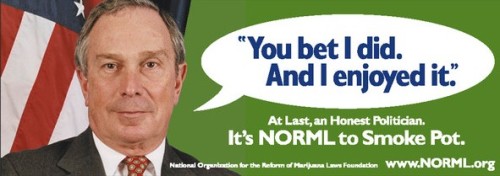This week’s Businessweek features a story about Michael Kennedy, a criminal defense attorney who is in the process of raising $300M for a new private equity fund.
Here is the cover illustration for the story:

Kennedy is the controlling owner of High Times magazine and his fund invests in marijuana-related businesses where you can purchase bongs and other marijuana-related accessories. The fund has an image management problem if this is the picture that publications associate with its partners.
High Times has an unfortunately stigmatized name. The entire industry does.
Cannabis was criminalized in 1937 largely due to its association with Mexican immigrants and public resentment towards that group during the Great Depression. Anti-marijuana propaganda driven by William Randolph Hearst and his newspaper empire furthered the public fear. Hearst allegedly had a vested interest in destroying the hemp industry because the raw material served as an alternative to wood pulp, threatening the value of his extensive timber holdings.
How many murders, suicides, robberies, criminal assaults, holdups, burglaries, and deeds of maniacal insanity [marijuana] causes each year, especially among the young, can be only conjectured. The sweeping march of its addiction has been so insidious that, in numerous communities, it thrives almost unmolested, largely because of official ignorance of its effects.
–Harry J Anslinger, Head of the Federal Bureau of Narcotics, 1937
We have officially become less ignorant about its effects in the past seven decades. Cannabis is potentially an effective form of treatment for pain management, sleep disorders, muscle spasms, and many other ailments.
The FDA will not approve cannabinoids as a form of treatment without evidence of safety and efficacy from clinical tests, but this research struggles to proceed because the federal government will not allow it and few are willing to fund it.

Learn More: Veterans for Compassionate Care
 Despite the medical and financial potential, cannabis investment is held back by its image problem. Alcohol was similarly demonized during the Temperance movement and subsequent Prohibition. The Volstead Act was enforced for 13 years; marijuana-legalization advocates have 77 years of censure to undo.
Despite the medical and financial potential, cannabis investment is held back by its image problem. Alcohol was similarly demonized during the Temperance movement and subsequent Prohibition. The Volstead Act was enforced for 13 years; marijuana-legalization advocates have 77 years of censure to undo.
Alcohol and Prohibition shed their public taint as it became clear that everyone was drinking illegally anyway. It became even more clear that only lower-class poor were being prosecuted for possession while the socially privileged stockpiled alcohol with impunity. Sound familiar?
Barack Obama, Clarence Thomas, and Michael Bloomberg all openly admit to marijuana use, but stop short at letting their personal ethics affect public policy.
I inhaled frequently. That was the point. –President Obama
Prohibition may soon be over, but until we shed the stigma, its effects will long remain.

See Also:
High Times on Wall Street –Businessweek


One thought on “Removing the Cannabis Stigma”